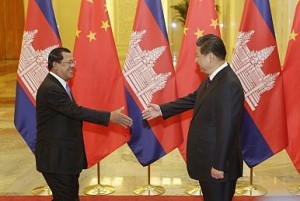Op-Ed: Foreign Policy
Cambodia Wants China as Its Neighborhood Bully
Phnom Penh’s pivot toward Beijing has less to do with the United States than hatred for Vietnam.
- BY TANNER GREER

In the closing months of 2016, all of Southeast Asia seemed to be pivoting toward China. Malaysian Prime Minister Najib Razak was hailed as a “visionary leader” by fellow Malaysian politicians for “tilting to China.” Thailand agreed to build an arms-maintenance and production center for China’s People’s Liberation Army, and the president of the Philippines declared in a speech delivered in Beijing’s Great Hall of the People: “In this venue I announce my separation from the United States.”
Americans have been left to ask: What did we do wrong? What has caused the leaders of Southeast Asia to turn away from Washington and toward Beijing? It is tempting to look for the answer to these questions in the policies of the Obama or Xi administrations, or blame it on shifting fortunes in the balance of power. But focusing on the spectacle of Sino-American rivalry masks the dozens of smaller dramas and power plays that usually escape the attention of Western observers. Often it is these smaller conflicts of interest that drive lesser powers into the arms of the great ones.
There is no better example of this than Cambodia, one of the first countries in the region to openly align itself with China. Cambodia’s position became clear in 2012, when it prevented ASEAN from issuing a joint communiqué that mentioned the South China Sea. Long-standing Cambodian dictator Hun Sen has reaped many rewards for this decision: In October, China granted Cambodia $237 million in direct aid, $90 million in canceled debt, and an additional $15 million in military support. Yet there is more behind Cambodian support for China than the size of Beijing’s pocketbook. In the minds of many Cambodians, the most difficult geopolitical challenge facing their country is not balancing the demands of the United States and China, but managing its relationship with Vietnam, an undertaking that cannot be successful without Chinese cooperation.
Ethnic disharmony is not hard to spot in Southeast Asia, but few of its prejudices — outside of the Myanmese hatred toward the Rohingya, at least — can match the distrust and disgust the average Khmer feels toward the Vietnamese. Recall how conservative Americans talked about the Soviet Union at the height of communist power, add the way their counterparts in modern Europe discuss Arab immigration now, and then throw in a dash of the humiliation that marked Germany in interwar years, and then you might come close to getting a fair idea of how wild and vitriolic a force anti-Vietnamese rhetoric is in Cambodian politics.
Cambodians have not forgotten the centuries of warfare that led Vietnamese armies to pillage the Khmer heartland and strip away more than half of its territory. Cambodian nationalists still pine for Khmer krom (“Lower Khmer”), a term used to describe both the ethnic Khmer living outside Cambodia and the lands they inhabit.
Without the intervention of the French in the 1860s, which transformed Cambodia into a French protectorate and southern Vietnam into a French colony, Cambodia would have been totally swallowed by the Vietnamese maw. French imperialism brought peace, but not harmony: Relations between the two groups only worsened under colonial control, as the French gave the Vietnamese a privileged status, and imperial policy supported Vietnamese migration to the Cambodian heartland. The subsequent governments that came to power in post-colonial times — the Sisowath, Lon Nol, and Khmer Rouge regimes — relied on anti-Vietnamese rhetoric to legitimize their rule to the Cambodian people.
Historically informed Cambodians are quick to point out that the Khmer Rouge was a creation of the Viet Cong; the more conspiratorial of their countrymen insist that the Khmer Rouge’s massacres were directed by them as well. Conspiratorial or not, Cambodians remember that 150,000 Vietnamese soldiers invaded Cambodia in 1978 and then occupied their country as foreign conquerors for the next 10 years. Though that decade-long war was not entirely the fault of the Vietnamese (China, Thailand, and the United States would support their own armed proxies), the violence of Vietnam’s counterinsurgency operations slowly eroded what goodwill they had earned by removing the Khmer Rouge from power.

